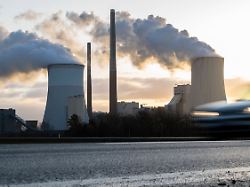Too many problems in Germany
ZEW boss: “Energy will never be really cheap again”
February 28, 2024, 8:13 a.m
Listen to article
This audio version was artificially generated. More info | Send feedback
After the dizzying increase caused by the Russian invasion of Ukraine, energy prices have become significantly cheaper again. ZEW boss Wambach nevertheless gives a pessimistic outlook on price developments. There are many problems with the expansion of cheap energy sources, especially wind power.
According to Achim Wambach, President of the Leibniz Center for European Economic Research (ZEW), consumers and companies in Germany will have to prepare for comparatively high energy prices in the future. “Energy will never be really cheap again. We have less wind and less sun than many other countries,” said Wambach. The consequences would particularly be felt by the energy-intensive sectors of the German economy.
“The labor market is starting to react,” said the economist. The chemical giant BASF, for example, wants to tighten its austerity measures and cut more jobs at its main plant in Ludwigshafen. “The big political task will be to achieve the necessary transformation towards climate neutrality without significant jobs being relocated abroad and unemployment increasing,” said Wambach.
From the perspective of the President of the Economic Research Institute, Germany is currently burdened by the highest corporate taxes in an international comparison, costs for bureaucracy, inadequate digitalization and the resulting reluctance of companies to invest. Disputes within the traffic light coalition caused uncertainty among companies and they held back on investments. “High uncertainty is a problem. A common will from the government is important and there is currently uncertainty,” said Wambach.
The cuts to the Growth Opportunities Act and its blockage in the Federal Council are also not a good signal. The CDU and CSU only want to agree to the package with tax relief and reductions in bureaucracy if the traffic light coalition withdraws the already decided reduction in tax relief for agricultural diesel for farmers. In the mediation process between the Bundestag and the Bundesrat, the volume of relief had already been reduced from the previously planned seven billion euros annually to 3.2 billion euros because the package led to a loss of income for the states.
Problems with expanding cheap wind power
Electricity from wind and solar systems is significantly cheaper than fossil fuels and nuclear energy. And especially with the windy coastal regions in the north and the sunny south, Germany definitely has potential. However, the expansion of wind power, the most important pillar of the energy transition, stalled significantly in Germany between 2018 and 2020. Only in the last few years has the whole thing picked up speed again. But it is still far from enough.
According to the European wind power association WindEurope, administrative hurdles are hindering expansion. It is known that the transport infrastructure in Germany is inadequate, said WindEurope boss Giles Dickson. But there is another problem in Germany, namely the permits for the transport of wind turbines. “This is a total mess.” This is also a problem in other countries, says Dickson. “But nowhere is it as bad as in Germany.”
For example, in order to transport a rotor blade through Germany, various permits are required from the respective federal states concerned. The accompaniment of special transports by the police must also be changed after crossing the national border.
ZWE boss: “Strengthen investments”
“We have to strengthen investments and need consistent structural reforms,” warned ZWE President Wambach. “The European internal market must also be further expanded.” The economist, on the other hand, sees inflation on a “good path”. Together with higher wages, this should strengthen private consumption, which is an important pillar of the German economy.
Inflation has been trending downward for some time. In January, consumer prices were 2.9 percent higher than in the same month last year. After the Russian attack on Ukraine in February 2022, energy and food prices in particular rose sharply. The inflation rate in Germany climbed to 8.8 percent in autumn 2022.
